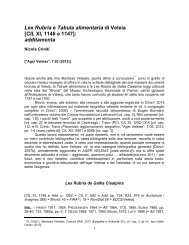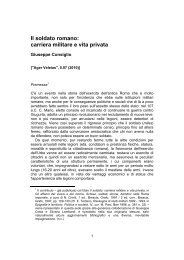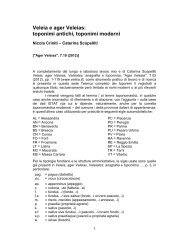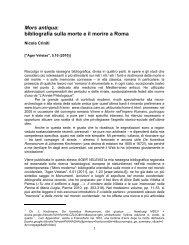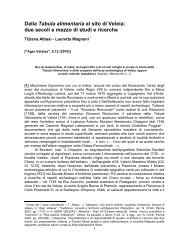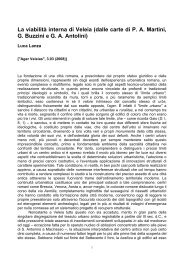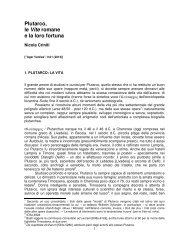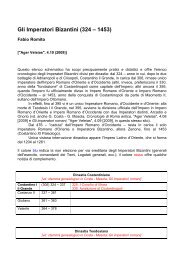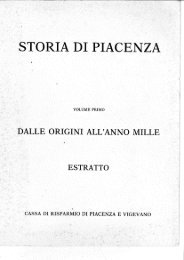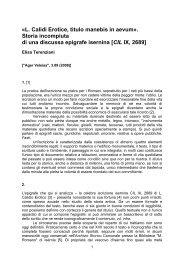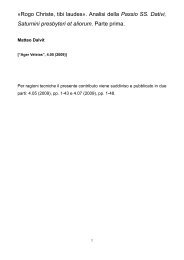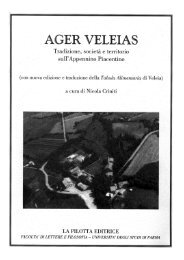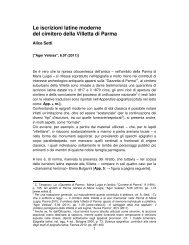Donne, liberti e schiavi nella Roma di Orazio - ager veleias
Donne, liberti e schiavi nella Roma di Orazio - ager veleias
Donne, liberti e schiavi nella Roma di Orazio - ager veleias
Create successful ePaper yourself
Turn your PDF publications into a flip-book with our unique Google optimized e-Paper software.
anche la citta<strong>di</strong>nanza romana (civitas): determinò inoltre, un'età minima (20 anni) per il<br />
padrone che manometteva i propri <strong>schiavi</strong> per testamento.<br />
3 Il possesso della citta<strong>di</strong>nanza romana sottolinea l'integrazione sociale (sebbene mai<br />
completa) del liberto.<br />
4 Cfr. <strong>Orazio</strong>, O<strong>di</strong> II, 4.<br />
5 Cfr. <strong>Orazio</strong>, Satire I, 2, 130-131.<br />
6 Cfr. <strong>Orazio</strong>, Satire I, 3, 80-83 e I, 8, 32-33.<br />
7 Cfr. <strong>Orazio</strong>, Satire I, 8, 8-10 (la traduzione, qui e in seguito, è <strong>di</strong> E. CETRANGOLO).<br />
8 Cfr., rispettivamente, <strong>Orazio</strong>, Satire I, 1, 96-97; I, 2, 41-42; Epistole I, 16, 63-65.<br />
9 Cfr. <strong>Orazio</strong>, Satire I, 1, 77-78.<br />
10 Cfr. <strong>Orazio</strong>, Satire I, 2, 44 e I, 9, 57.<br />
11 Cfr. <strong>Orazio</strong>, Satire II, 5, 70-73.<br />
12 Cfr. <strong>Orazio</strong>, O<strong>di</strong> III, 17, 14-16.<br />
13 Cfr. <strong>Orazio</strong>, Epistole II, 2, 187-189.<br />
14 Cfr. <strong>Orazio</strong>, Epo<strong>di</strong> 2, 65-66.<br />
15 Cfr. <strong>Orazio</strong>, Satire I, 2, 116-118. Per quanto riguarda l'attività omo- ed eterosessuale<br />
coinvolgente <strong>schiavi</strong> e <strong>liberti</strong> cfr. O<strong>di</strong> I, 33, 13-16; Satire I, 2, 47-48; I, 2, 101-103; Epo<strong>di</strong><br />
11, 1-4; Epistole I, 18, 72-74: su <strong>Orazio</strong>, in particolare, è significativa la testimonianza <strong>di</strong><br />
Svetonio (Sui poeti pp. 109-110).<br />
16 Cfr. <strong>Orazio</strong>, Satire II, 6, 65-67: in particolare sulla considerazione del verna, secondo<br />
l'ottica del padrone, cfr. Epistole II, 2, 2-19 e Satire II, 6, 108-109.<br />
17 Cfr. <strong>Orazio</strong>, Epistole I, 14, 15 ss.<br />
18 Cfr., rispettivamente, <strong>Orazio</strong>, Epistole I, 14, 1 e II, 2, 160-161.<br />
19 Cfr. <strong>Orazio</strong>, Epistole I, 14, 14.<br />
20 Cfr. <strong>Orazio</strong>, Satire II, 7, 117-118.<br />
21 Cfr. <strong>Orazio</strong>, Epistole I, 14, 42 e Satire II, 8, 72.<br />
22 Cfr. <strong>Orazio</strong>, Satire I, 3, 80-81.<br />
23 Cfr. <strong>Orazio</strong>, Satire II, 4, 78-80.<br />
24 Cfr. <strong>Orazio</strong>, Satire I, 6, 116; II, 6, 106-110; II, 8, 10; Epo<strong>di</strong> 9, 33.<br />
25 Cfr. <strong>Orazio</strong>, Satire II, 8, 70.<br />
26 Cfr. <strong>Orazio</strong>, Satire I, 10, 92; I, 5, 66.<br />
27 Cfr. <strong>Orazio</strong>, Satire I, 6, 107-109 (e 116 per gli <strong>schiavi</strong> del poeta).<br />
28 Cfr. <strong>Orazio</strong>, Satire II, 6, 44; Epistole I, 18, 36.<br />
29 Cfr. <strong>Orazio</strong>, Epistole I, 18, 35-36.<br />
30 Cfr. <strong>Orazio</strong>, Satire II, 7, 58-59.<br />
31 Cfr. <strong>Orazio</strong>, Epistole I, 7, 58-59.<br />
32 Cfr. <strong>Orazio</strong>, Epistole I, 20, 20; Satire I, 6, 6 e 45: e Svetonio, Sui poeti pp. 109-110<br />
Rostagni, che registra la con<strong>di</strong>zione <strong>liberti</strong>na del padre e la sua professione, exactionum<br />
coactor sulla testimonianza del figlio, ovvero salsamentarius (pizzicagnolo) secondo una<br />
<strong>di</strong>ceria maligna. L'attività <strong>di</strong> coactor argentarius (esattore delle pubbliche aste: cfr. Satire I,<br />
6, 86) era strettamente connessa con quella del praeco, il ban<strong>di</strong>tore: in Epistole I, 7, 50-95,<br />
la descrizione del ban<strong>di</strong>tore non deve essere considerata come il ritratto del padre, ma<br />
come testimonianza del fatto che <strong>Orazio</strong> conosceva il vario ed eterogeneo mondo a cui<br />
suo padre appartenne.<br />
33 Cfr. in particolare Satire I, 4, 105-125 e 6, 65-99; II, 2 (i precetti <strong>di</strong> Ocello come spunto<br />
della morale <strong>di</strong> <strong>Orazio</strong>-padre).<br />
34 Cfr. <strong>Orazio</strong>, Satire I, 71: <strong>Orazio</strong>, riferendosi al padre "macro pauper agello …", sembra<br />
in<strong>di</strong>care un modesto appezzamento terriero, probabilmente a Venosa o <strong>di</strong>ntorni.<br />
35 Cfr. <strong>Orazio</strong>, Epo<strong>di</strong> 4, 7-10: e cfr. Epo<strong>di</strong> 4, 5-6.<br />
36 Cfr. <strong>Orazio</strong>, Satire I, 4, 105-108: e cfr. Satire I, 1, 108 ss.<br />
37 Cfr. <strong>Orazio</strong>, Satire I,6,45-48 (e in generale il resto del componimento contro l'esclusivo<br />
prestigio dato dalla nascita).<br />
25



